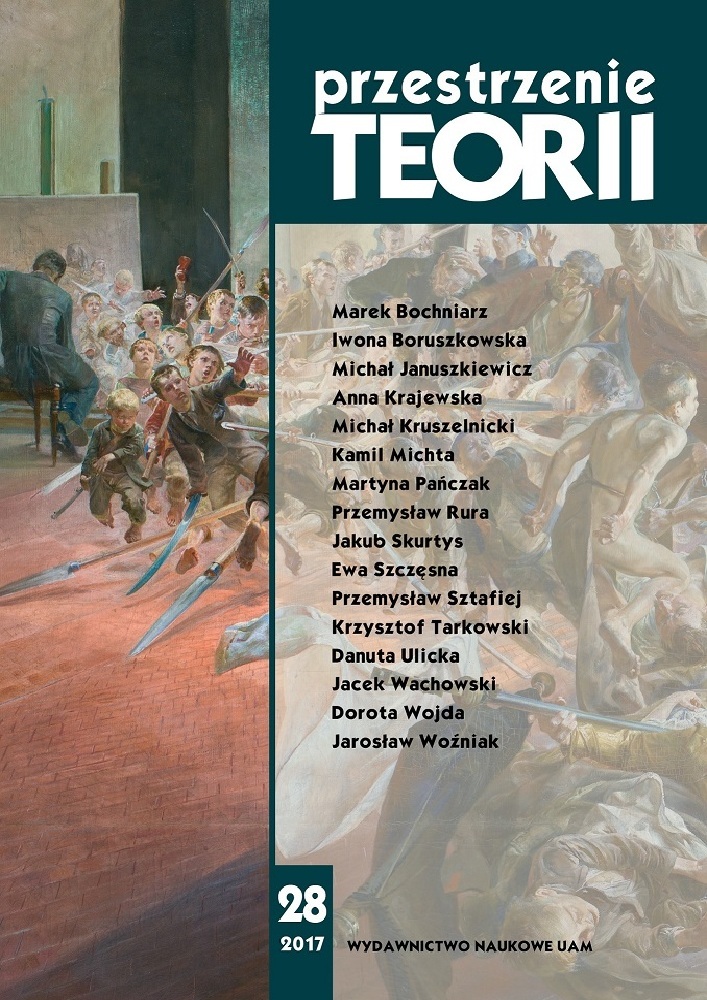Abstrakt
The concept of existence is rooted in (at least) two traditions: philosophical and literary theory. This does not mean, however, that it means the same for both fields. The first tradition is wide ranging because it includes diverse – physical, emotional and spiritual (as well as intellectual) – aspects of being. The second tradition is narrow and it closely refers to literary output. Literary existence – which is based on physical reality – is permanently separated from it. Literature refers to the representation and imagination of the world, not to the empirical experience of physical reality. In addition, literature does not apply the categories of truth and falsehood that we know from social reality (because literary existence stands, beyond the assertion). It is also imprisoned in genology – inscribed in the genre. Literary existence has more to do with poetry, style, artistic convention than what philosophers are examining. Sometimes great literary works deal with great philosophical problems, but sometimes do not and it do not detract from their artistic nature. Both of these tradition – literary and philosophical – however, have many common places, require careful study and analysis. The article is an attempt to show these places and characterize their features.Bibliografia
Arystoteles, Poetyka 1450a, 25, tłum. H. Podbielski, BN seria II, nr 209, Wrocław 1983.
Austin J.A., Jak działać za pomocą słów, [w:] tegoż, Mówienie i poznawanie, tłum. J. Woleński, Warszawa 1993, s. 550–708.
Bartol K., Wypędzić poezję, wygnać poetów. Współczesne interpretacje Platońskiego postulatu, „Poznańskie Studia Polonistyczne” Seria Literacka, 2012, nr 19, s. 13–30.
Brentano F., Psychologia z empirycznego punktu widzenia, tłum. W. Galewicz, Warszawa 1999.
Chrudzimski A., Intentionalität, Zeitbewusstsein und Intersubjektivität. Studien zur Phänomenologie von Brentano bis Ingarden, Frankfurt 2005.
Chrudzimski Z., Teoria intencjonalności Romana Ingardena, „Edukacja Filozoficzna” 1998, 25, s. 249–250.
Deleuze G., Różnica i powtórzenie, tłum. B. Banasiak, K. Matuszewski, Warszawa 1997.
Gawroński A., Dlaczego Platon wykluczył poetów z państwa? U źródeł współczesnych badań nad językiem, przedmowa Z. Kubiak, Warszawa 1984.
Hopensztand D., Mowa pozornie zależna w kontekście „Czarnych skrzydeł”, [w:] Stylistyka teoretyczna w Polsce, red. K. Budzyk. Warszawa 1946.
Husserl E., Vorlesungen über Bedeutungslehre. Sommersemester 1908, “Husserliana” XXVI, hrsg. von U. Panzer, Dordrecht 1986.
Ingarden R., O dziele literackim, Warszawa 1960.
Ingarden R., O pytaniach esencjalnych, [w:] tegoż, Z teorii języka i filozoficznych podstaw logiki, Warszawa 1972.
Ingarden R., Studia z estetyki, t. 1, Warszawa 1956.
Ingarden R., Z badań nad filozofią współczesną, Warszawa 1963.
Krokos J., Odsłanianie intencjonalności, Warszawa 2013, s. 19.
Lem S., Filozofia przypadku. Literatura w świetle empirii, Kraków 1968.
Meinong A., „Über Gegenstandstheorie”, in Gesamtausgabe, Bd. II, Graz 1971, s. 481–535.
Münch D., Intention und Zeichen. Untersuchungen zu Franz Brentano und zu Edmund Husserls Frühwerk, Frankfurt am Main 1993.
Ong W.J., Oralność i piśmienność. Słowo poddane technologii, tłum i wstęp J. Japola, Lublin 1992.
Platon, Ion, 534 B-C, [w:] tegoż, Dialogi, t. 1, tłum. W. Witwicki, Kęty 1999.
Platon, Państwo, 597-598, [w:] tegoż, Państwo, Prawa, tłum. W. Witwicki, Kęty 1999.
Sachs-Hombach K., Philosophische Psychologie im 19. Jahrhundert. Ihre Ent – stehung und Problemgeschichte, Freiburg-München 1993.
Szczepańska A., Estetyka Romana Ingardena, Warszawa 1989.
Topika antyczna w literaturze polskiej XX wieku, red. A. Brodzka, E. Sarnowska-Temeriusz, Wrocław 1992.
Wawrzyniak A., Egzystencja, [w:] Powszechna encyklopedia filozofii, red. A. Maryniarczyk, t. 3, Lublin 2002, s. 33–34.
Wysłouch S., Literatura i semiotyka, Warszawa 2001.
Ziomek J., Retoryka opisowa, Wrocław 1990.
Licencja
Autorzy
Autorzy tekstów przyjętych do publikacji w czasopiśmie „Przestrzeniach Teorii” są zobowiązani do wypełnienia, podpisania i odesłania na adres redakcji umowy o udzielenie nieodpłatnej licencji do utworów, z zobowiązaniem do udzielania sublicencji CC.
Zgodnie z umową, autorzy tekstów opublikowanych w czasopiśmie „Przestrzeniach Teorii” udzielają Uniwersytetowi im. Adama Mickiewicza w Poznaniu niewyłącznej i nieodpłatnej licencji oraz zezwalą na użycie sublicencji Creative Commons Attribution-NonCommercial-NoDerivatives 4.0 International (CC BY-NC-ND 4.0).
Autorzy zachowują prawa do dalszego, swobodnego rozporządzania utworem.
Autorzy, którzy wykorzystują w swoim tekście cudze utwory (np. ilustracje, fotografie) proszeni są o dostarczenie do redakcji czasopisma zgodę na publikację od uprawnionych podmiotów.
Użytkownicy
Zainteresowani użytkownicy internetu uprawnieni są do korzystania z utworów opublikowanych po 2015 roku „Przestrzeniach Teorii” tylko w calach niekomercyjnych, pod następującymi warunkami:
- uznanie autorstwa - obowiązek podania wraz z rozpowszechnionym utworem, informacji, o autorstwie, tytule, źródle (odnośniki do oryginalnego utworu, DOI) oraz samej licencji;
- bez tworzenia utworów zależnych - utwór musi być zachowany w oryginalnej postaci, nie można bez zgody twórcy rozpowszechniać np. tłumaczeń, opracowań.
Do wszystkich tekstów opublikowanych przed 2015 r. prawa autorskie są zastrzeżone.
Inne
Uniwersytet im. Adama Mickiewicza w Poznaniu zachowuje prawo do czasopisma jako całości (układ, forma graficzna, tytuł, projekt okładki, logo itp.).
